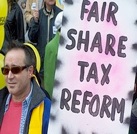THE FIX: THE FAIR SHARE TAX REFORM
This is the fix to make our tax system fair and allow our
economy to flourish.
Under the proposed Fair Share Reform, almost all taxes are based on income & wealth - the two best measures of how much each household has profited from services governments provide.
Only income and wealth that are needed to “get by” are untaxed or taxed at a reduced rate.
The reform cuts thousands of dollars off of each working-poor and middle-class family’s total tax bill each year and everyone pays their fair share.
Every household pays federal, state & local taxes, & contributes to any war effort.
Federal revenue increases by one-tenth - to that of Clinton years (% of GDP) .. Balanced Budget
Your one-page combined federal-state-town tax return would take one hour for you to fill out.
-
1. FEDERAL INCOME TAX:
A progressive tax with a clear justification, taxing only money that families need for basic needs (a living
wage) at a lower rate than the flat 20% rate. That is ...
All household income - whether from wages, other compensation or business profits - are taxed at a 20%
rate - except only the following, which is taxed at a 3% rate for everyone:
-
- Income under a realistic poverty line (the first $15,000 for single; $25,000 couple; $30,000 family of 3)
-
- Money & compensation for medical expenses exceeding 6% of income
-
-Income placed into or spent from modest tax-free education-retirement accounts
- NO other adjustments, deductions, or exemptions!
Owners & shareholders of businesses & corporations taxed 20% on US-portion of all profits (details follow).
Effective rates (family of three): 3% on $20,000; 10% on $65,000; 15% on $140,000; 20% on >$20,000,000.
There is a minimum tax of $100 per year for every household.
This Income Tax totals 63% of federal revenue.
-
2. FEDERAL NET-WORTH TAX:
-
Net-worth is the best measure of how much a household has profited from the economic infrastructure
-
governments (all taxpayers) have paid for. It is also the best way to tax capital gains (i.e. A 1% tax on
-
wealth is a deemed 20% tax on average capital gains of 5%.
-
This tax is paid once a year and replaces current capital gains taxes, estate taxes, property taxes (see#5).
-
All household net worth (accumulated wealth) is taxed at a 2% rate, except the first ~$800,000 for a
-
typical family. That untaxed first ~$800,000 is 150% of the median home value + capped tax-free
-
retirement/education account value + $25,000 per person + up to $50,000 of personal property + up to
-
$5000 small business value.
Effective rates (% of net worth - typical family): 0% on <$800,000; 1% on $1.6mill.; 2% on >$32mill.
This Net-worth Tax totals 25% of federal revenue.
-
3.FEDERAL WAR TAX: Everyone contributes to any war effort: A 6% surcharge increases a federal tax bill of
-
$10,000 to $10,600 during any year the nation is at war & two years thereafter. Minimum tax $50 a yr.
-
4. EXCISE TAXES only on products that have a cost to society that is not reflected in their price ...
e.g. cigarettes, gasoline. Partly prebated for the very poor. Totals only about 8% of federal revenue.
-
5. ELIMINATE ALL THESE TAXES:
- Social Security ("Payroll") Taxes - Reformed Social Security & Medicare funded from general revenue
- Estate Taxes & Capital Gain Taxes - Replaced by more efficient and fair Net-worth Tax
- State Income Taxes in their current form - Replaced by more efficient & fair surcharge - See #6 below
- Property (real estate) taxes - Replaced by Net-worth Tax and more efficient and fair surcharge - See #6
- Sales taxes, tolls, lotteries, etc. - Replaced by more efficient and fair surcharge and excise - See #6
-
-Corporate Taxes - Instead profits are largely distributed to corporations’ owners & shareholders and then taxed as income.
-
6.ALL STATE AND MUNICIPAL GOVERNMENTS eliminate all their current taxes & tolls and instead set and collect a surcharge on a household's combined Federal Income and Net-worth Tax. The average combined surcharge for your state and local government would at first total about 50% of your household’s federal tax bill, but decline over the years. (see details on “Spending & Debt” page)








































